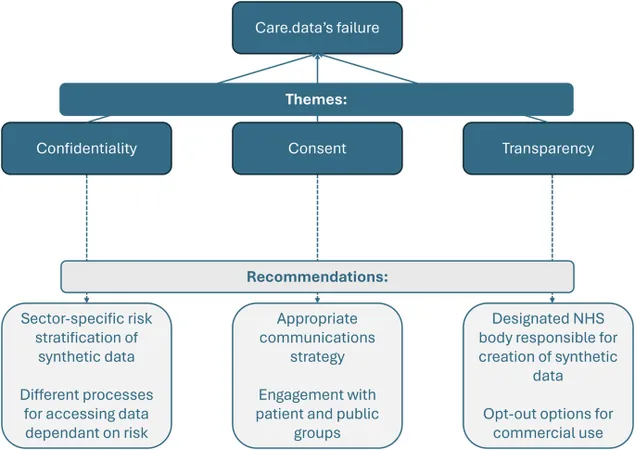
Unlocking Health Data: Lessons from Care.data on Synthetic Data Use
2025-08-09
Author: Li
Understanding Synthetic Data and Its Promise
In a world overflowing with information, the true potential of synthetic data remains a puzzle. Defined by the Royal Society and the Alan Turing Institute, synthetic data refers to information generated by tailored algorithms aimed at solving specific data-science challenges. The Office for National Statistics divides synthetic data into six levels, ranging from basic 'structural' synthetic datasets, which merely mimic the original format without analytical value, to 'replica' datasets that closely resemble the original, perfect for in-depth statistical analysis.
The Transformative Power of Synthetic Data
Imagine a scenario where health data becomes readily available for researchers, leading to groundbreaking models with enhanced fairness and performance. Deep learning—AI's frontier utilizing intricate neural networks—has massive potential in clinical settings. However, the lack of data can hinder model accuracy, leading to issues like 'underfitting' or 'overfitting' due to data imbalances. With the UK's vast health data from the NHS spanning diverse populations, synthetic data could bridge gaps in representation across socioeconomic statuses and ethnic backgrounds, ultimately ensuring broader applicability of research findings.
Navigating Ethical Waters: Privacy vs. Utility
As promising as synthetic data appears, ethical dilemmas loom large. The balance of privacy against data fidelity, known as the privacy-fidelity trade-off, raises concerns about synthetic datasets that too closely resemble real data. Higher fidelity means a greater risk of re-identification—a serious issue in healthcare, particularly highlighted in the care.data controversy, where patient confidentiality became a hot topic due to fears of misuse.
The Care.data Cautionary Tale
The care.data initiative faced fierce backlash primarily due to fears over data breaches and inadequate patient consent, leading to its eventual withdrawal. Pseudo-anonymisation methods were scrutinized under GDPR laws, revealing that stripping data of identifiers does not fully eliminate the risk of re-identifying individuals. Trust issues escalated, especially among professional stakeholders concerned about how such data sharing could compromise the doctor-patient relationship.
A New Approach to Privacy Metrics
For the future of synthetic data to be secure and successful, implementing comprehensive privacy metrics to classify data into risk categories is vital. Establishing national standards—developed by multidisciplinary teams—would help mitigate identification risks while protecting patient anonymity. This proactive approach encourages data sharing while safeguarding privacy, with varying levels of access based on data fidelity.
Importance of Consent and Transparency
Patient trust is paramount in leveraging synthetic data for research. Historical failures, like those witnessed with care.data, highlight the critical need for effective communication and consent processes that consider accessibility for all patients. Engagement in Patient and Public Involvement is essential to build understanding around synthetic data, aligning patient rights with data-sharing initiatives.
Guarding Public Interests: The Need for Clarity
The fallout from care.data illuminated the public’s demand for transparency regarding who accesses their health data. Future synthetic data initiatives must clearly outline data usage intentions and vet external parties wishing to use high-fidelity synthetic datasets for public benefit. Allowing patients to opt-out of data generation enhances autonomy and trust.
Conclusion: Harnessing Potential While Learning from the Past
Synthetic data stands as a beacon of hope for solving pressing issues of data scarcity and bias in AI model development. However, to ensure its successful implementation within the UK, the lessons from care.data regarding privacy, consent, and transparency must be heeded. By prioritizing these elements, synthetic data initiatives can pave the way for innovation in healthcare while firmly placing patient welfare at the forefront.


 Brasil (PT)
Brasil (PT)
 Canada (EN)
Canada (EN)
 Chile (ES)
Chile (ES)
 Česko (CS)
Česko (CS)
 대한민국 (KO)
대한민국 (KO)
 España (ES)
España (ES)
 France (FR)
France (FR)
 Hong Kong (EN)
Hong Kong (EN)
 Italia (IT)
Italia (IT)
 日本 (JA)
日本 (JA)
 Magyarország (HU)
Magyarország (HU)
 Norge (NO)
Norge (NO)
 Polska (PL)
Polska (PL)
 Schweiz (DE)
Schweiz (DE)
 Singapore (EN)
Singapore (EN)
 Sverige (SV)
Sverige (SV)
 Suomi (FI)
Suomi (FI)
 Türkiye (TR)
Türkiye (TR)
 الإمارات العربية المتحدة (AR)
الإمارات العربية المتحدة (AR)